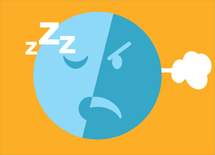The pandemic is likely to affect everyone, regardless of age or occupation.
Are you (or a loved one) feeling stressed, anxious, or depressed? Rest assured: This is normal and you’re not alone!
Psychological distress: Do you recognize the signs?
It’s not always obvious when someone you know—or even yourself—is experiencing psychological distress. However, there are certain signs that point to something being wrong:
1. PHYSICAL
- Headaches/neck tension
- Digestive issues
- Sleep problems
- Loss of appetite
2. PSYCHOLOGICAL AND EMOTIONAL
- Concerns and insecurity
- Feeling overwhelmed
- Negative perception of everyday things or events
- Feeling discouraged, sad or angry
3. BEHAVIOURAL
- Problems concentrating
- Irritability, aggression
- Isolation, withdrawal
- Addictions (alcohol, drugs, medication, gambling)
|
Health advice |
|
Some people are at higher risk for psychosocial problems. Pay close attention to people:
|
|
For information purposes only; non-exhaustive list. |
Are you worried about yourself or a loved one? There are many helpful resources out there!
|
Ça ne va pas? Nos intervenants psychosociaux en CLSC sont là! |
Des services adaptés au contexte de pandémie |
Intervenir différemment auprès des jeunes et leur famille |
- Info-Social 811
Phone consultation service
- Tel-Aide: 1-855-377-0600
- Québec suicide prevention line: 1-866-APPELLE (277-3553)
- Suicide prevention and crisis centres
- La Maison sous les Arbres (Châteauguay): 450-699-5935
- Le Tournant (Suroît): 450-371-4090
Addictions
Are you worried about yourself or a loved one? We’re here for you!
Help is just a phone call away:
450-443-4413 (toll-free: 1-866-964-4413)
Helpful documents
- Coping with stress, anxiety and substance use during COVID-19
- Addiction problem? Get the help you need!
Taking care of yourself
Pandemic or not, everyone is likely to experience distress at some point in their lives, regardless of what they do for a living. Check out tools/resources/health advice on themes such as:
- stress, anxiety, anger, depression, and suicidal thoughts;
- financial problems;
- family life and marital/family problems.
Taking care of our children and teens (support for parents)
We’ve put together several useful links to help you:
- explain COVID-19 to children;
- help manage stress and anxiety;
- cope better with the lockdown;
- keep children/teens busy;
- improve your telework/family balance;
- and much more!
Seniors’ zone
There are several tools available.
Deconditioning guide - Age 70 and over
This guide contains tips and advice to help people age 70 and over, despite the COVID-19 pandemic, to:
- Stay healthy;
- Maintain their independence;
- Take care of themselves;
- Limit their risk of falling;
- Preserve their physical strength.
Case-finding: My Home, My Choice
The CISSS de la Montérégie-Ouest, in collaboration with community organizations and various community partners, has set up a project to identify seniors age 75 and over who need help maintaining their independence.
To find out more, visit the page dedicated to this project.
Useful links
We’ve put together several useful links:
Tools for caregivers and the bereaved
Informal caregivers are essential partners whose role is all the more important amid the COVID-19 pandemic.
Sadly, some people may also be living with the loss of a loved one, whether or not related to COVID-19. This is a life-changing event, and unfortunately the pandemic has changed the way people are able to grieve.
For that reason, we’ve put together some relevant information to support caregivers and bereaved individuals.
For more information, click here!
Pregnant and breastfeeding women
- Information for pregnant women – Coronavirus (COVID-19) (MSSS)
- Recommendations for pregnant women and for parents of children 0-17 years
- Coronavirus (COVID-19) and breastfeeding: Information for parents during the pandemic
Tools for partners
A toolkit has been developed on psychosocial support, well-being, and the identification of psychological distress. It is mainly designed for:
- social housing and community resources;
- community organizations;
- child care services;
- municipalities;
- schools (including adults).